In my angular 4 project I am using some matDatepicker, It works correctly if I select a date from datepicker but if I write manually the date in the input field I see the date in an incorrect Locale.
I am following this: github, but I only see correct locale when I chose the date and not if I write the date. Is it possible that the locale is overwritten?
This is the date-adapter:
/**
* @license
* Copyright Google LLC All Rights Reserved.
*
* Use of this source code is governed by an MIT-style license that can be
* found in the LICENSE file at https://angular.io/license
*/
import {Inject, Injectable, Optional} from '@angular/core';
import {DateAdapter, MAT_DATE_LOCALE, MatDateFormats} from '@angular/material';
// Depending on whether rollup is used, moment needs to be imported differently.
// Since Moment.js doesn't have a default export, we normally need to import using the `* as`
// syntax. However, rollup creates a synthetic default module and we thus need to import it using
// the `default as` syntax.
// TODO(mmalerba): See if we can clean this up at some point.
import * as _moment from 'moment';
// import {default as _rollupMoment, Moment} from 'moment';
import 'moment/locale/fr';
import { Moment } from 'moment';
const moment = _moment; // _rollupMoment || _moment;
export const MOMENT_DATE_FORMATS: MatDateFormats = {
parse: {
dateInput: 'D/MM/YYYY'
},
display: {
dateInput: 'DD/MM/YYYY',
monthYearLabel: 'MMMM Y',
dateA11yLabel: 'LL',
monthYearA11yLabel: 'MMMM Y'
}
};
/** Creates an array and fills it with values. */
function range<T>(length: number, valueFunction: (index: number) => T): T[] {
const valuesArray = Array(length);
for (let i = 0; i < length; i++) {
valuesArray[i] = valueFunction(i);
}
return valuesArray;
}
/** Adapts Moment.js Dates for use with Angular Material. */
@Injectable()
export class MomentDateAdapter extends DateAdapter<Moment> {
// Note: all of the methods that accept a `Moment` input parameter immediately call `this.clone`
// on it. This is to ensure that we're working with a `Moment` that has the correct locale setting
// while avoiding mutating the original object passed to us. Just calling `.locale(...)` on the
// input would mutate the object.
private _localeData: {
firstDayOfWeek: number,
longMonths: string[],
shortMonths: string[],
dates: string[],
longDaysOfWeek: string[],
shortDaysOfWeek: string[],
narrowDaysOfWeek: string[]
};
constructor(@Optional() @Inject(MAT_DATE_LOCALE) dateLocale: string) {
super();
this.setLocale(dateLocale || moment.locale());
}
setLocale(locale: string) {
super.setLocale(locale);
let momentLocaleData = moment.localeData(locale);
this._localeData = {
firstDayOfWeek: momentLocaleData.firstDayOfWeek(),
longMonths: momentLocaleData.months(),
shortMonths: momentLocaleData.monthsShort(),
dates: range(31, (i) => this.createDate(2017, 0, i + 1).format('D')),
longDaysOfWeek: momentLocaleData.weekdays(),
shortDaysOfWeek: momentLocaleData.weekdaysShort(),
narrowDaysOfWeek: momentLocaleData.weekdaysMin(),
};
}
getYear(date: Moment): number {
return this.clone(date).year();
}
getMonth(date: Moment): number {
return this.clone(date).month();
}
getDate(date: Moment): number {
return this.clone(date).date();
}
getDayOfWeek(date: Moment): number {
return this.clone(date).day();
}
getMonthNames(style: 'long' | 'short' | 'narrow'): string[] {
// Moment.js doesn't support narrow month names, so we just use short if narrow is requested.
return style == 'long' ? this._localeData.longMonths : this._localeData.shortMonths;
}
getDateNames(): string[] {
return this._localeData.dates;
}
getDayOfWeekNames(style: 'long' | 'short' | 'narrow'): string[] {
if (style == 'long') {
return this._localeData.longDaysOfWeek;
}
if (style == 'short') {
return this._localeData.shortDaysOfWeek;
}
return this._localeData.narrowDaysOfWeek;
}
getYearName(date: Moment): string {
return this.clone(date).format('YYYY');
}
getFirstDayOfWeek(): number {
return this._localeData.firstDayOfWeek;
}
getNumDaysInMonth(date: Moment): number {
return this.clone(date).daysInMonth();
}
clone(date: Moment): Moment {
return date.clone().locale(this.locale);
}
createDate(year: number, month: number, date: number): Moment {
// Moment.js will create an invalid date if any of the components are out of bounds, but we
// explicitly check each case so we can throw more descriptive errors.
if (month < 0 || month > 11) {
throw Error(`Invalid month index "${month}". Month index has to be between 0 and 11.`);
}
if (date < 1) {
throw Error(`Invalid date "${date}". Date has to be greater than 0.`);
}
let result = moment({year, month, date}).locale(this.locale);
// If the result isn't valid, the date must have been out of bounds for this month.
if (!result.isValid()) {
throw Error(`Invalid date "${date}" for month with index "${month}".`);
}
return result;
}
today(): Moment {
return moment().locale(this.locale);
}
parse(value: any, parseFormat: string | string[]): Moment | null {
if (value && typeof value == 'string') {
return moment(value, parseFormat, this.locale);
}
return value ? moment(value).locale(this.locale) : null;
}
format(date: Moment, displayFormat: string): string {
date = this.clone(date);
if (!this.isValid(date)) {
throw Error('MomentDateAdapter: Cannot format invalid date.');
}
return date.format(displayFormat);
}
addCalendarYears(date: Moment, years: number): Moment {
return this.clone(date).add({years});
}
addCalendarMonths(date: Moment, months: number): Moment {
return this.clone(date).add({months});
}
addCalendarDays(date: Moment, days: number): Moment {
return this.clone(date).add({days});
}
toIso8601(date: Moment): string {
return this.clone(date).format();
}
/**
* Returns the given value if given a valid Moment or null. Deserializes valid ISO 8601 strings
* (https://www.ietf.org/rfc/rfc3339.txt) and valid Date objects into valid Moments and empty
* string into null. Returns an invalid date for all other values.
*/
deserialize(value: any): Moment | null {
let date;
if (value instanceof Date) {
date = moment(value);
}
if (typeof value === 'string') {
if (!value) {
return null;
}
date = moment(value, moment.ISO_8601).locale(this.locale);
}
if (date && this.isValid(date)) {
return date;
}
return super.deserialize(value);
}
isDateInstance(obj: any): boolean {
return moment.isMoment(obj);
}
isValid(date: Moment): boolean {
return this.clone(date).isValid();
}
invalid(): Moment {
return moment.invalid();
}
}
In my app.module
import { MomentDateAdapter, MOMENT_DATE_FORMATS } from './shared/moment-date-adapter/moment-date-adapter';
{ provide: MAT_DATE_LOCALE, useValue: 'it-IT' },
{ provide: MAT_DATE_FORMATS, useValue: MOMENT_DATE_FORMATS },
{ provide: DateAdapter, useClass: MomentDateAdapter },
But still not working, this is the output:

first one is selected date, second date is written